Readings
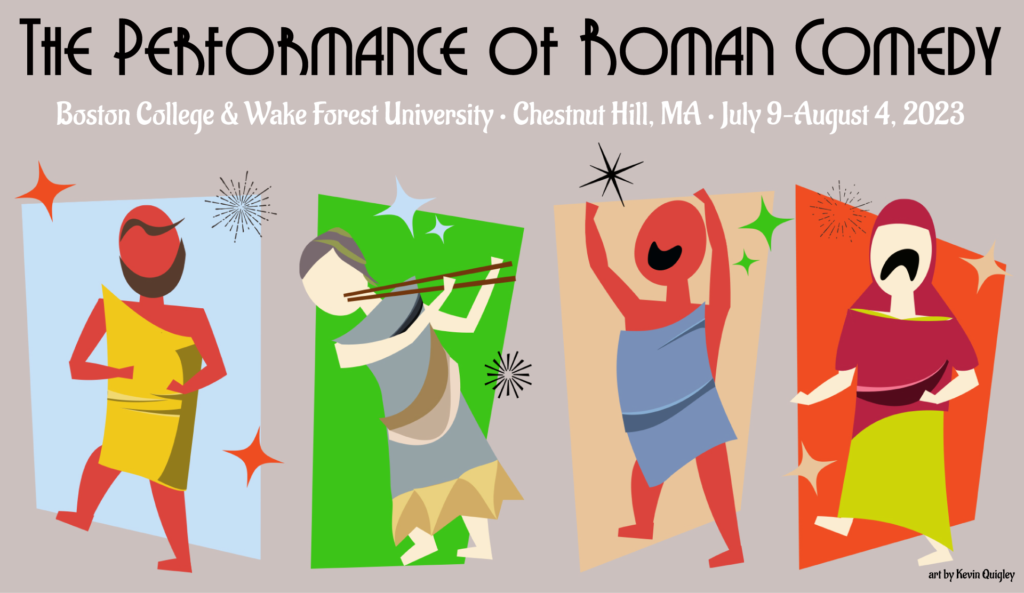
Quick links
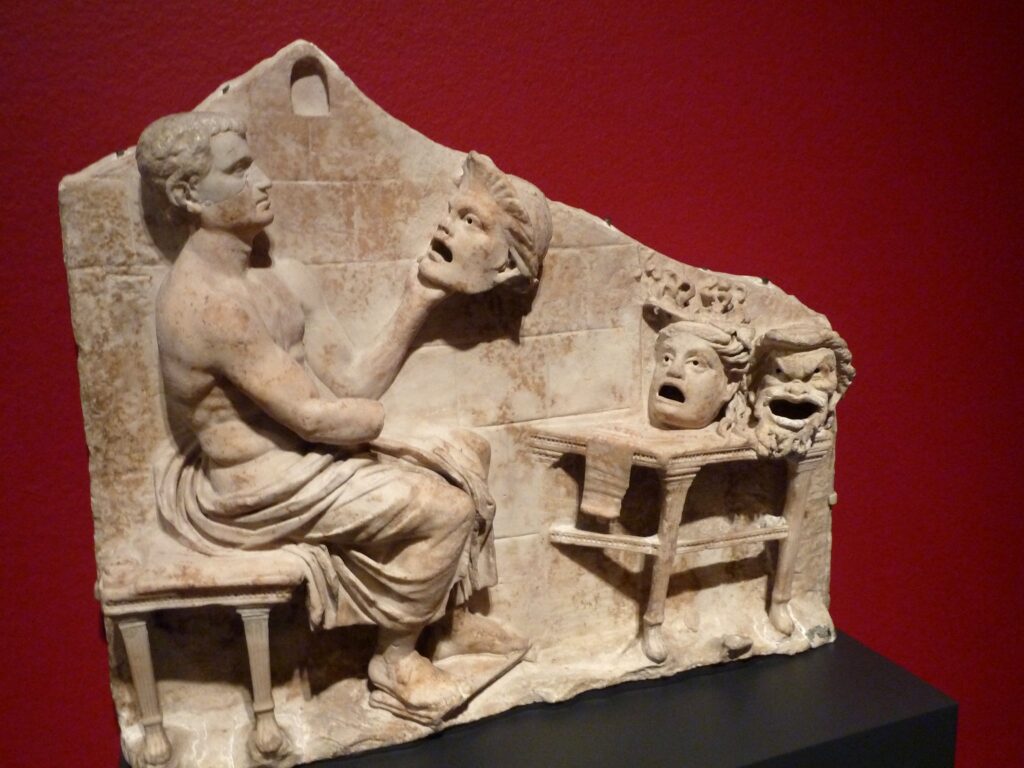
“Getty Villa – Collection” by The Consortium is licensed under CC BY-SA 2.0 .
readings folder (access restricted to participants)
before the Institute
Monday, July 10
Tuesday, July 11
Wednesday, July 12
Thursday, July 13
Friday, July 14
Monday, July 17
Tuesday, July 18
Wednesday, July 19
Thursday, July 20
Friday, July 21
Monday, July 24
Tuesday, July 25
Wednesday, July 26
Thursday, July 27
Friday, July 28
Before the Institute
You will need to read all of the following before arriving in Boston for the Institute:
- All extant plays by Plautus and Terence.
The 2011 Loeb Classical Library translations by Wolfgang de Melo are readily available at most university libraries and online at the Digital Loeb. Subscriptions to the Digital Loeb are available through many university libraries and through membership in the Classical Association of New England. - Gellar-Goad, T. H. M. 2021. Plautus: Curculio. London: Bloomsbury.
A short introduction to Roman comedy via a study of its shortest play. Read in its entirety. Available in paperback or ebook here. - All videos from the 2012 NEH Institute on The Performance of Roman Comedy.
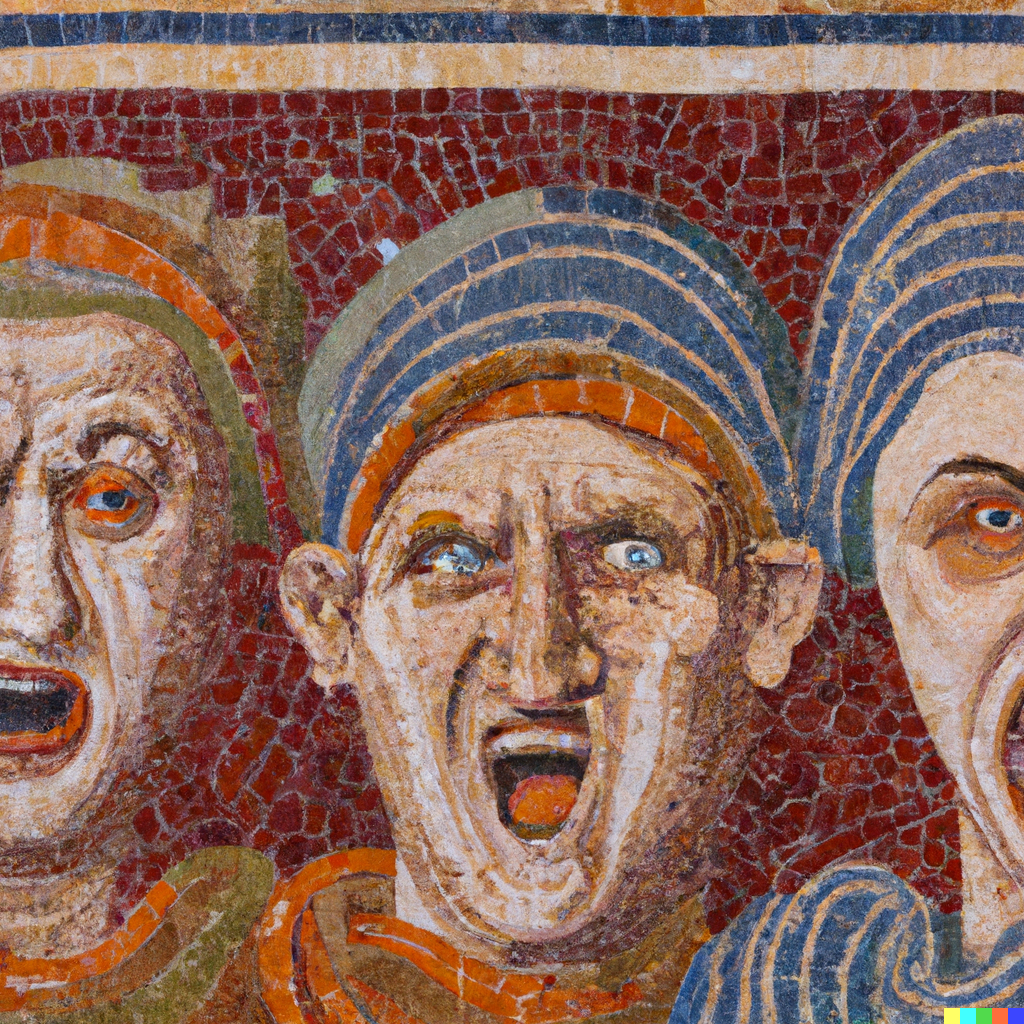
Image created by T. H. M. Gellar-Goad using DALL·E.
At the Institute
All readings to be done during the Institute will be made available to participants in advance of the Institute’s start. Readings are listed under the day they are due: you’ll need to read them prior to the morning session for that day.
Monday, July 10: Space
Timothy J. Moore, morning session expert facilitator
morning session in Vanderslice 117
rehearsals today: ensemble scenes
Required readings
- Sander M. Goldberg, “Plautus on the Palatine,” Journal of Roman Studies 88 (1998), pp. 1–20.
- Sander M. Goldberg, “Theater without Theaters: Seeing Plays the Roman Way,” TAPA 148.1 (2018), pp. 139–172.
Optional readings
- C. W. Marshall, The Stagecraft and Performance of Roman Comedy (Cambridge, 2006), pp. 16–56, 72–82.
- Here’s a link to some PDFs with resources from Prof. Moore’s presentations.
Tuesday, July 11: Music, Meter, Dance
Timothy J. Moore, morning session expert facilitator
morning session in Vanderslice 117
rehearsals today: smaller scenes
Required readings
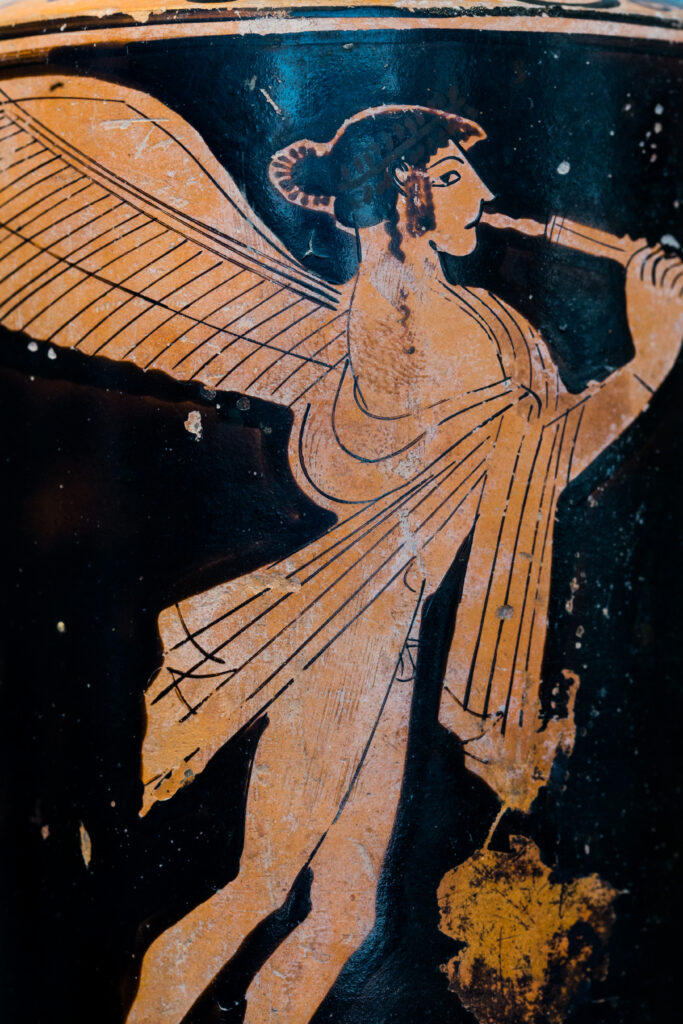
“File:Bowdoin Painter ARV 683 123 flying Eros playing auloi (02).jpg” by ArchaiOptix is licensed under CC BY-SA 4.0 .
- T. H. M. Gellar-Goad, “Music and Meter in Plautus,” in A Companion to Plautus, edd. Dorota Dutsch and George F. Franko (Malden, MA, 2020), pp. 251–267.
- Timothy J. Moore, Music in Roman Comedy (Cambridge, 2012), pp. 171–209.
Required activity
- Following these instructions, take a look at where the meters change in one or both of the scenes in which you will be performing this summer, using Timothy J. Moore’s “The Meters of Roman Comedy” Database.
- Here’s a link to some PDFs with resources from Prof. Moore’s presentations.
- Here’s a link to some of Prof. Moore’s recordings of Plautine cantica.
- Here’s a link to the Barnard/Columbia performance of Euripides’ Herakles with aulos.
Optional readings
- Timothy J. Moore, “Music and Gender in Terence’s Hecyra,” in Women in the Drama of the Roman Republic, edd. Dorota Dutsch, Sharon L. James, and David Konstan (Madison, 2015), pp. 68–87.
- Timothy J. Moore, “Roman Comedy and the Final Dance,” in Aspects of Roman Dance Culture, ed. Karin Schlapbach (Stuttgart, 2022), pp. 159–178. Available open access here.
Wednesday, July 12: Masks, Costumes, Props
Amy R. Cohen & C. W. Marshall, morning session expert facilitators
morning session in Bonn Studio Theater
rehearsals today: ensemble scenes
Required readings
- C.W. Marshall, The Stagecraft and Performance of Roman Comedy (Cambridge, 2006), pp. 56–72 and 126–158.
Optional readings
- Robert C. Ketterer, “Stage Properties in Plautine Comedy I,” Semiotica 58 (1986), pp. 193–216.
- Robert C. Ketterer, “Stage Properties in Plautine Comedy II,” Semiotica 59 (1986), pp. 93–135.
- Robert C. Ketterer, “Stage Properties in Plautine Comedy III,” Semiotica 60 (1986), pp. 29–72.
- Gesine Manuwald, Roman Republican Theater (Cambridge, 2011), pp. 68–80.
- Antonis K. Petrides, “Plautus between Greek Comedy and Atellan Farce: Assessments and Reassessments,” in The Oxford Handbook of Greek and Roman Comedy, edd. Michael Fontaine and Adele Scafuro (Oxford, 2014), pp. 424–443.
Thursday, July 13: Actors, Acting Style, Movement
Amy R. Cohen & C. W. Marshall, morning session expert facilitators
morning session in Bonn Studio Theater
rehearsals today: smaller scenes
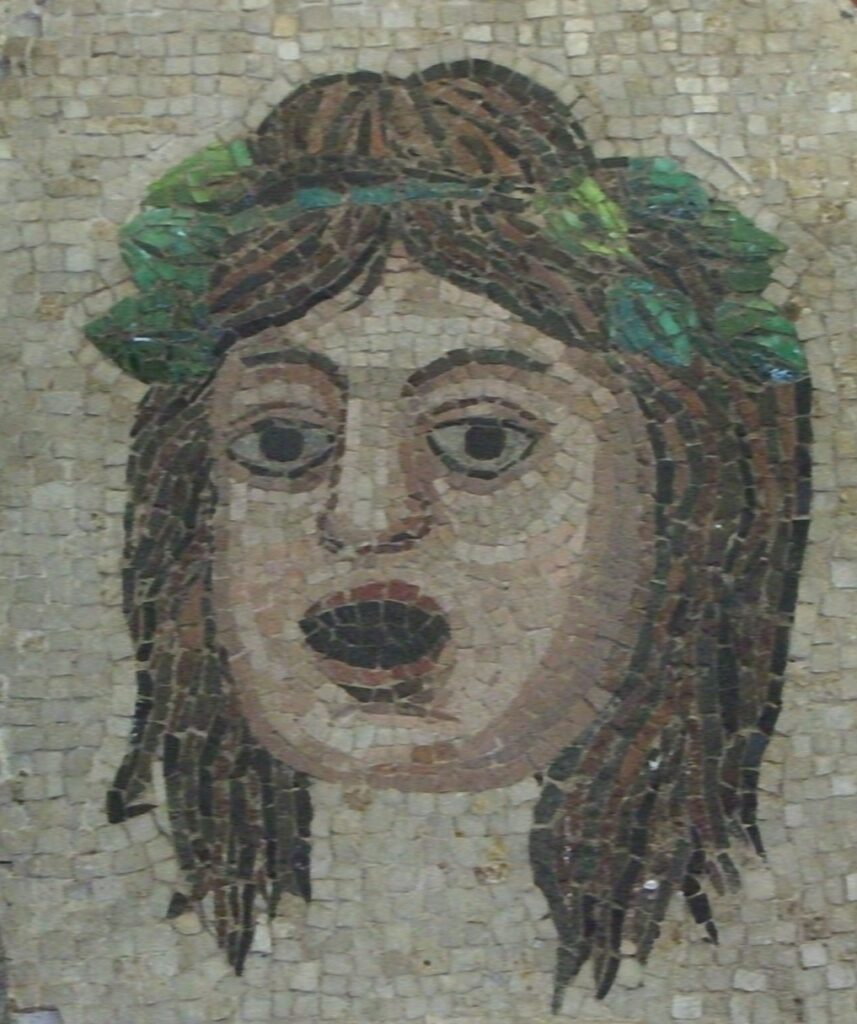
“Mosaic showing a Roman mask” by A.M. Kuchling is licensed under CC BY-SA 2.0 .
Required readings
- C.W. Marshall, The Stagecraft and Performance of Roman Comedy (Cambridge, 2006), pp. 159–202.
Optional readings
- Isabella Tardin Cardoso, “Comic Technique,” in The Cambridge Companion to Roman Comedy, edd. M.T. Dinter (Cambridge, 2019), pp. 120–135.
- Gesine Manuwald, Roman Republican Theater (Cambridge, 2011), pp. 80–90.
Friday, July 14: Language & Style
Peter Barrios-Lech, morning session expert facilitator
morning session in Bonn Studio Theater
rehearsals today: ensemble scenes
Required readings
- Peter Barrios-Lech, “The Language of Plautus,” in A Companion to Plautus, edd. Dorota Dutsch & George F. Franko (Malden, MA, 2020), pp. 221–236.
- Evangelos Karakasis, “The Language of Roman Comedy,” in The Cambridge Companion to Roman Comedy, ed. Martin T. Dinter (Cambridge, 2019), pp. 151–170.
Optional readings
- Wolfgang de Melo, “The Language of Roman Comedy,” in A Companion to the Latin Language, edd. James Clackson (Malden, MA, 2011), pp. 321–343.
- Evangelos Karakasis, “The Language of the Palliata,” in The Oxford Handbook of Greek and Roman Comedy, edd. Michael Fontaine and Adele Scafuro (Oxford, 2014), pp. 555–579.
Monday, July 17: Humor
Erin K. Moodie, morning session expert facilitator
morning session in Vanderslice 117
rehearsals today: ensemble scenes
Required readings
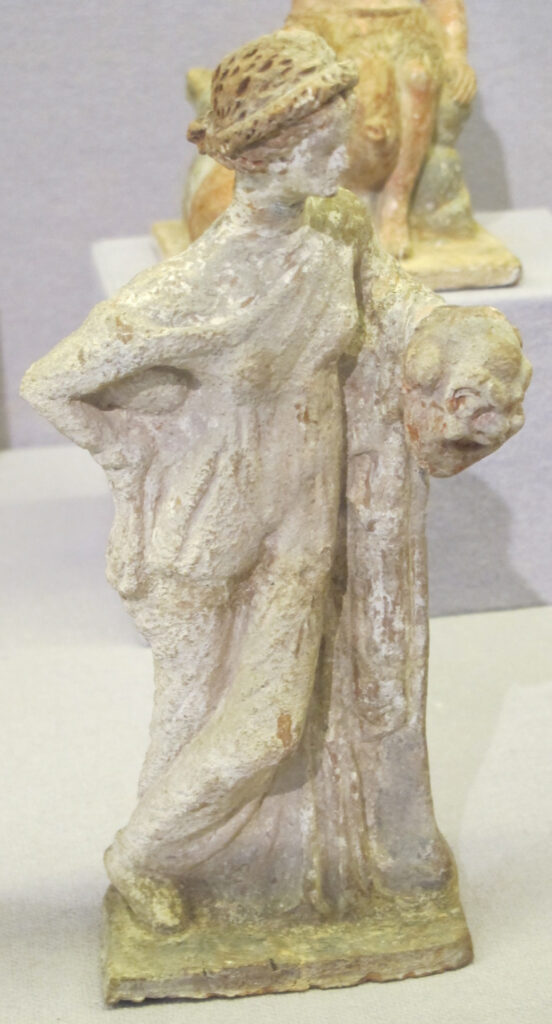
“File:Terracotta da tanagra, musa della commedia, 250-200 ac..JPG” by sailko is licensed under CC BY-SA 3.0 .
- Erin K. Moodie, “License to Thrill: Humor and Linguistic Accuracy in Translations of Roman Comedy,” Classical Journal 111.1 (2015), pp. 11–23.
- Martin T. Dinter, “Comic Technique in Plautus’ Asinaria and Casina,” in A Companion to Plautus, edd. Dorota Dutsch and George F. Franko (Malden, MA, 2020), pp. 269–285.
- Erin K. Moodie, “In Defense of Milphio: Aggressive Puns and Status Transactions in Plautus’ Poenulus,” Classical World 111.3 (2018), pp. 321–350 (n.b., read only pp. 321–324).
Optional readings
- Amy Richlin, “The Traffic in Shtick,” in Rome, Empire of Plunder: The Dynamics of Cultural Appropriation, edd. by Matthew Loar, Carolyn MacDonald, and Dan-el Padilla Peralta (Cambridge, 2018), pp. 169–193.
Tuesday, July 18: Metatheater & Plautinopolis
Rachel Mazzara & Niall W. Slater, morning session expert facilitators
morning session in Vanderslice 117
rehearsals today: smaller scenes
Required readings
- Niall W. Slater, Plautus in Performance: The Theatre of the Mind (Princeton, 1985), pp. 2–18.
- David Christenson, “Metatheatre,” in The Cambridge Companion to Roman Comedy, ed. Martin T. Dinter (Cambridge, 2019), pp. 136–150.
- Rachel Mazzara, “Plautinopolis: Imagination and Representation in Plautus’ Roman Comedy,” Ph.D. diss. (Toronto, 2021), pp. 22–55.
Optional readings
- Adrian S. Gratwick, “Light Drama,” The Cambridge History of Classical Literature, vol. 2: Latin Literature, ed. E. J. Kenney (Cambridge, 1982), pp. 112–115.
- Clara S. Hardy, “The Parasite’s Daughter: Metatheatrical Costuming in Plautus’ Persa,” Classical World 99.1 (2005), pp. 25–33.
- Rodrigo Lessa and João Araújo, “World Consistency,” in The Routledge Companion to Imaginary Worlds, ed. Mark J. P. Wolf (New York, 2017), pp. 90–97.
- Timothy J. Moore, The Theatre of Plautus: Playing to the Audience (Austin, 1998), ch. 3.
- Martin Revermann, “The Competence of Theatre Audiences in Fifth- and Fourth-Century Athens,” Journal of Hellenic Studies 126 (2006), pp. 99–124.
- Benjamin J. Robertson, “World Completeness,” in The Routledge Companion to Imaginary Worlds, ed. Mark J. P. Wolf (New York, 2017), pp. 82–89.
Wednesday, July 19: Sex, Gender, Sexual Violence
Sharon L. James, morning session expert facilitator
morning session in Bonn Studio Theater
rehearsals today: ensemble scenes
Required readings

- Sharon L. James, “Gender and Sexuality in Terence,” in A Companion to Terence, edd. Antony Augoustakis and Ariana Traill (Malden, MA, 2013), pp. 175–194.
- Serena S. Witzke, “Gender and Sexuality in Plautus,” in A Companion to Plautus, edd. Dorota Dutsch and George F. Franko (Malden, MA, 2020), pp. 331–346.
- Sharon L. James, “Repetition, civic status, and remedy: Women and trauma in New Comedy,” in Emotional Trauma in Greece and Rome: Representations and Reactions, edd. Andromache Karanika and Vassiliki Panoussi (London, 2019), pp. 49–70.
Optional readings
- Anne Feltovich, “Controlling Images: Enslaved Women in Greek and Roman Comedy,” Arethusa 54.1 (2021), pp. 73–92.
- Sharon L. James, “Ancient Comedy, Women’s Lives: Finding Social History and Seeing the Present in Classical Comedy,” Humanities Futures.
- Sharon L. James, “Case Study IV: Domestic Female Slaves in Roman Comedy,” in A Companion to Women in the Ancient World, edd. Sharon L. James and Sheila Dillon (Malden, MA, 2012), pp. 235–237.
- Amy Richlin, “Schrödinger’s Pussy: Slave Actors and Fluid Desire in Early Roman Comedy,” in The Bloomsbury Companion to Gender and Theatre Research, edd. Sean Metzger and Roberta Mock (London, forthcoming).
Thursday, July 20: Class & Enslavement
Amy Richlin, morning session expert facilitator
morning session in Bonn Studio Theater
rehearsals today: smaller scenes
Required readings
- Amy Richlin, “Talking to Slaves in the Plautine Audience,” Classical Antiquity 33.1 (2014), pp. 174–226.
- Antonin J. Obrdlik, “Gallows Humor: A Sociological Phenomenon,” American Journal of Sociology 47.5 (1942), pp. 709–716.
- Michelle Cliff, The Land of Look Behind (Ithaca, 1985), pp. 40–47.
- Prof. Richlin highly recommends reading the following optional reading from yesterday’s session, especially for participants who didn’t start with much knowledge about Roman comedy:
Amy Richlin, “Schrödinger’s Pussy: Slave Actors and Fluid Desire in Early Roman Comedy,” in The Bloomsbury Companion to Gender and Theatre Research, edd. Sean Metzger and Roberta Mock (London, forthcoming).
Optional readings
- bell hooks, Black Looks: Race and Representation, 2nd ed. (London, 2014), ch. 7.
- Amy Richlin, “Role-Playing in Roman Civilization and Roman Comedy Courses: How to Imagine a Complex Society,” Classical Journal 108.3 (2013), pp. 347–361.
- Amy Richlin, “The Ones Who Paid the Butcher’s Bill: Soldiers and War Captives in Roman Comedy,” in Brill’s Companion to Military Defeat in Ancient Mediterranean Society, edd. Jessica Homan Clark and Brian Turner (Leiden, 2017), pp. 213–239.
- Nathan Rosenstein, Rome and the Mediterranean 290 to 146 BC (Edinburgh, 2012), pp. 86–95.
- James C. Scott, Domination and the Arts of Resistance (New Haven, 1990), pp. 1–44.
- Alan Watson, Roman Private Law around 200 BC (Edinburgh, 1971).
Friday, July 21: Ethnicity & Colonialism
Deepti Menon, morning session expert facilitator
morning session in Bonn Studio Theater
rehearsals today: ensemble scenes
Required readings
- Deepti Menon, “Travels through the Foreign Imaginary on the Plautine Stage,” Ph.D. diss. (Santa Barbara, 2020), selections.
Optional readings
- Peter G. Barrios-Lech, “Theatergrams in Plautine Comedy: the Case of Hanno in Poenulus,” in Plautus’ Erudite Comedy: New Insights into the Work of a Doctus poeta, edd. Sophia Papaioannou and Chrysanthi Demetriou (Newcastle upon Tyne, 2020), pp. 75–120.
- Amy Richlin, “Blackface and Drag in the Palliata,” in Complex Inferiorities: The Poetics of the Weaker Voice in Latin Literature, edd. Sebastian Matzner and Stephen Harrison (Oxford, 2019), pp. 49–72.
Monday, July 24: Politics, War, Empire
Matthew Leigh, morning session expert facilitator
morning session in Vanderslice 117
rehearsals today: ensemble scenes
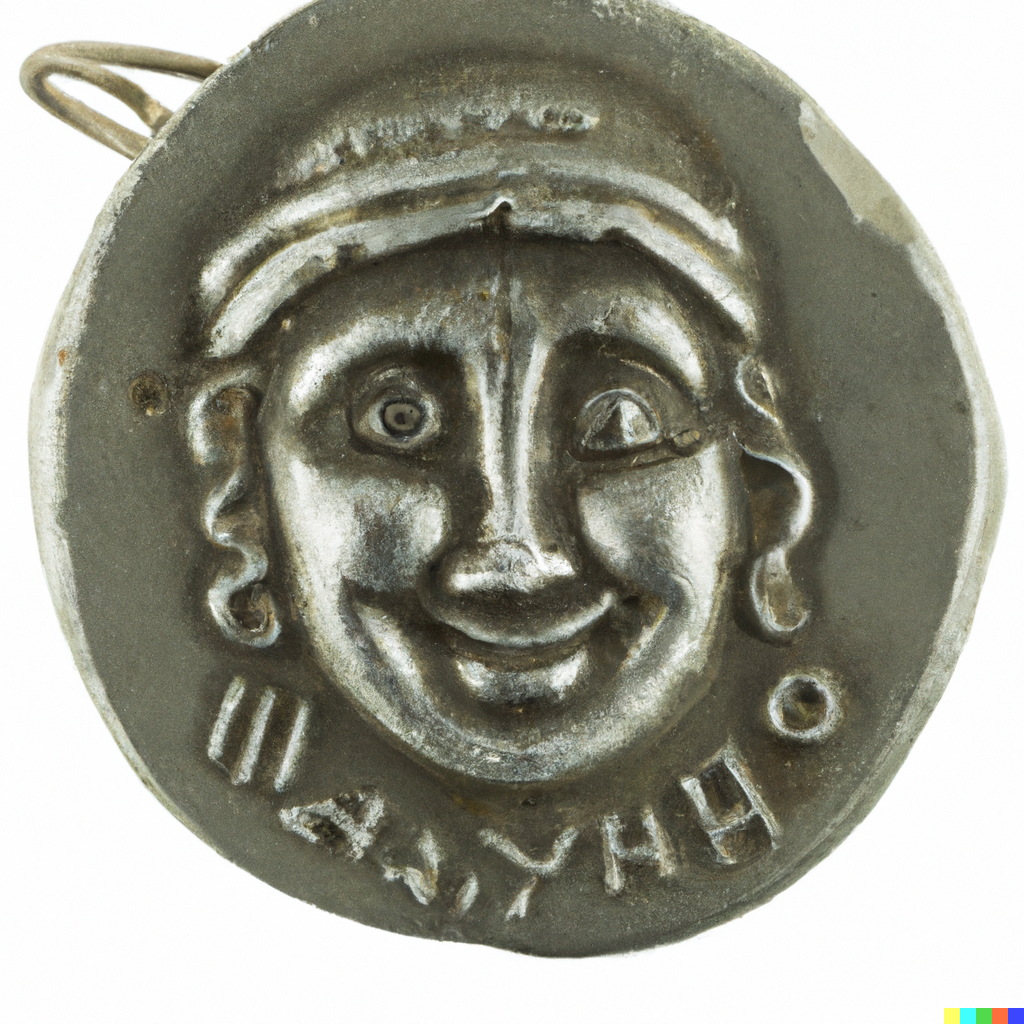
Image created by T. H. M. Gellar-Goad using DALL·E.
Required readings
- Matthew Leigh, Comedy and the Rise of Rome (Oxford, 2004), pp. 57–97.
Optional readings
- Robert Germany, “The Politics of Comedy,” in The Cambridge Companion to Roman Comedy, ed. Martin T. Dinter (Cambridge, 2019), pp. 68–84.
- Matthew Leigh, Comedy and the Rise of Rome (Oxford, 2020), pp. 1–23.
Tuesday, July 25: Religion
Seth Jeppesen & Dan-el Padilla Peralta, morning session expert facilitators
morning session in Vanderslice 117
rehearsals today: smaller scenes
Required readings
- Seth A. Jeppesen, “Religion in and around Plautus,” in A Companion to Plautus, edd. Dorota Dutsch and George F. Franko (Malden, MA, 2020), pp. 317–330.
- Dan-el Padilla Peralta, “Slave Religiosity in the Roman Middle Republic,” Classical Antiquity 36.2 (2017), pp. 317–369.
Optional readings
- Seth Bernard, “In Search of Aeneas at the Sanctuary of Castrum Inui (Ardea),” Journal of Roman Archaeology 32 (2019), pp. 561–573.
- Edward Bispham and Daniele Miano, edd., Gods and Goddesses in Ancient Italy (London, 2020).
- Anthony Corbeill, “Dreams and the prodigy process in Republican Rome,” in Sub imagine somni: Nighttime Phenomena in Greco-Roman Culture, edd. Emma Scioli and Christine Walde (Pisa, 2010), pp. 81–101.
- Harriet I. Flower, “Fabula de Bacchanalibus: the Bacchanalian cult of the second century BC and Roman drama,” in Identität und Alterität in der frührömischen Tragödie, ed. Gesine Manuwald (Würzburg, 2020), pp. 23–35.
- Gesine Manuwald, Roman Republican Theater (Cambridge, 2011), pp. 41–55.
- Lisa M. Mignone, The Republican Aventine and Rome’s Social Order (Ann Arbor, 2016).
- Eric Orlin, “Urban Religion in the Middle and Late Republic,” in A Companion to Roman Religion, ed. Jörg Rüpke (Malden, MA, 2007), pp. 58–70.
- Dan-el Padilla Peralta, Divine Institutions: Religions and Community in the Middle Roman Republic (Princeton, 2020).
- Celia E. Schultz, Women’s Religious Activity in the Roman Republic (Chapel Hill, 2006).
- Celia E. Schultz, “Roman Sacrifice, Inside and Out.” Journal of Roman Studies 106 (2016), pp. 58–76.
- T. P. Wiseman, Unwritten Rome (Exeter, 2008).
Wednesday, July 26: Adaptation & Production
Seth Jeppesen & V. Sophie Klein, morning session expert facilitators
morning session in Bonn Studio Theater
rehearsals today: ensemble scenes
Required readings
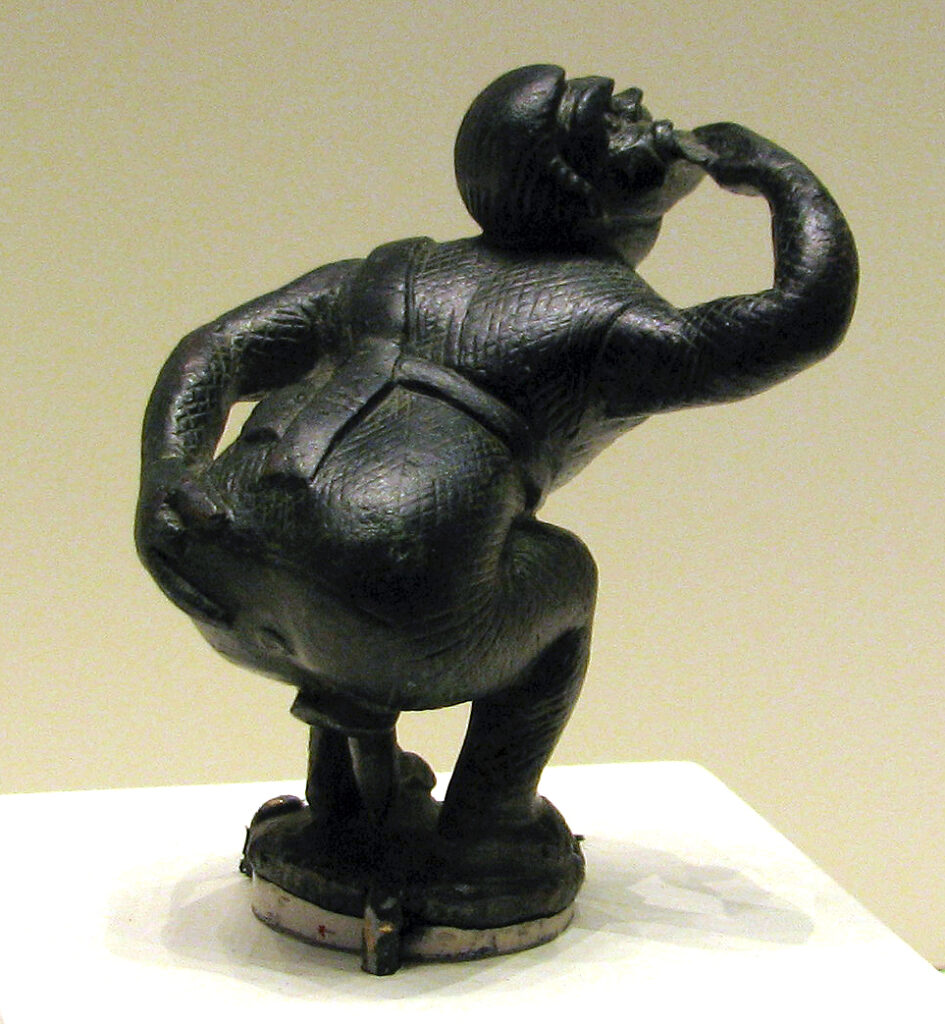
“Comic actor” by Taifighta is licensed under CC BY-NC-SA 2.0 .
- Amy Richlin, Rome & the Mysterious Orient (Berkeley, 2005), pp. 30–52.
- Mary-Kay Gamel, “Revising ‘Authenticity’ in Staging Ancient Mediterranean Drama,” in Theorising Performance: Greek Drama, Cultural History and Critical Practice, edd. Edith Hall and Stephe Harrop (Duckworth, 2010), pp. 153–170.
- V. Sophie Klein, Plautus: Menaechmi (London, 2022), ch. 4.
Optional readings
- Mary-Kay Gamel, “Can ‘Democratic’ Modern Stagings of Ancient Drama be ‘Authentic’?,” in Classics in the Modern World: A Democratic Turn?, edd. Lorna Hardwick and Stephen Harrison (Oxford, 2013), pp. 183–195.
- Linda Hutcheon and Siobhan O’Flynn, A Theory of Adaptation, 2nd ed. (London, 2013), pp. 1–32, 141–167.
Thursday, July 27: Reception on the Stage
Serena S. Witzke, morning session expert facilitator
morning session in Bonn Studio Theater
rehearsals today: smaller scenes
Required readings
- Antony Augoustakis, “Hrotsvit of Gandersheim Christianizes Terence,” in A Companion to Terence, edd. Antony Augoustakis and Ariana Traill (Malden, MA, 2013), pp. 397–409.
- Serena S. Witzke, “‘I Knew I Had a Brother!’ Fraternity and Identity in Plautus’ Menaechmi and Oscar Wilde’s The Importance of Being Earnest,” in Oscar Wilde and Classical Antiquity, edd. Kathleen Riley, Alastair J. L. Blanshard, and Iarla Manny (Oxford, 2017), pp. 321–336.
- William of Blois, Alda.
Optional readings
- Skim Oscar Wilde, The Importance of Being Earnest.
- Peter G. McC. Brown, “The Eunuch Castrated: Bowdlerization in the Text of the Westminster Latin Play,” International Journal of the Classical Tradition 15.1 (2008), pp. 16–28.
- Robert Faulkner, “Clizia and the Enlightenment of Private Life,” in The Comedy and Tragedy of Machiavelli: Essays on the Literary Works, ed. Vickie B. Sullivan (New Haven, 2000), pp. 30–56.
- Robert S. Miola, Shakespeare and Classical Comedy (Oxford, 1994), pp. 19–37.
Friday, July 28: Reception on the Screen
T. H. M. Gellar-Goad & Christopher B. Polt, morning session expert facilitators
morning session in Bonn Studio Theater
rehearsals today: ensemble scenes
Required reading
- Malamud, Margaret. 2001. “Brooklyn-on-the-Tiber: Roman Comedy on Broadway and in Film.” In Imperial Projections: Ancient Rome in Modern Popular Culture, edd. Sandra R. Joshel, Margaret Malamud, and Donald T. McGuire, Jr. Baltimore: Johns Hopkins University Press. 191–208.
Required viewings
- A Funny Thing Happened on the Way to the Forum.
- Watch Seinfeld season 6, episode 10, “The Race.”
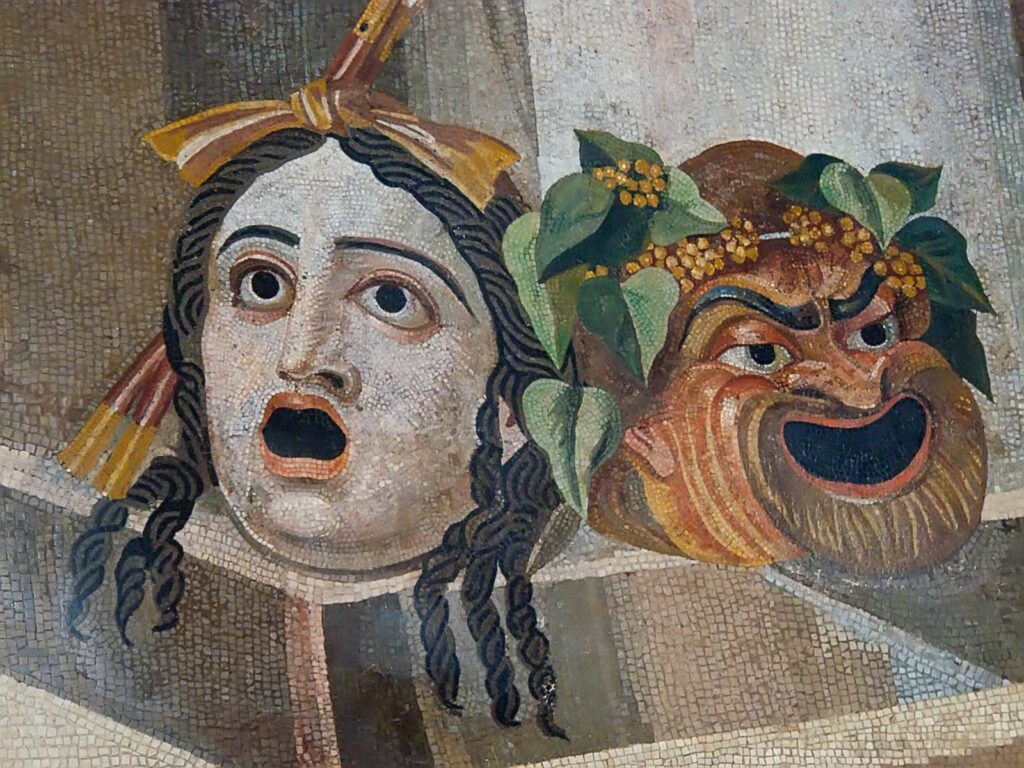
“Mosaic depicting theater masks Roman 2nd century CE” by mharrsch is licensed under CC BY-NC-SA 2.0 .
Monday–Wednesday, July 31–August 2: Filming
Bonn Studio Theater
No assigned readings for these days!
Thursday, August 3: Preparations for dissemination
Bonn Studio Theater
No assigned readings for this day!
Friday, August 4: Institute wrap-up
Bonn Studio Theater
No assigned readings for this day!
The Performance of Roman Comedy has been made possible by a major grant from the National Endowment for the Humanities: Democracy demands wisdom.

Any views, findings, conclusions, or recommendations expressed in this program do not necessarily represent those of the National Endowment for the Humanities.
